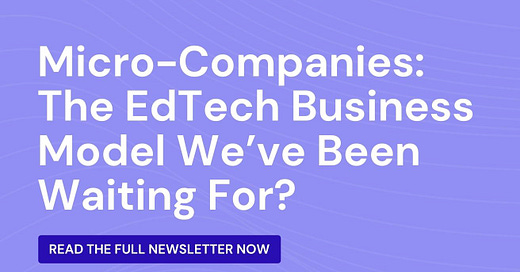Micro-Companies: The Edtech Business Model We've Been Waiting For?
And more on the AI x Education Conference, a New Era of Higher Education Disruption, the Instructure and Khan Academy Partnership, and Byju’s
Are Micro-Companies The New EdTech Business Model We’ve All Been Waiting For?
By Ben Kornell
As we head into back-to-school season, 2023-24 is shaping up to be an excruciatingly tight year for most Edtech ventures big and small. While we may not be officially in a global recession, it sure feels like one in Edtech:
customer budgets are razor thin across K12, HigherEd, and Workforce
core costs for Edtech companies continue to inch up
consumer fatigue is driving spend consolidation (reducing both the number of vendors and cost per vendor) and churn
In response to the uncertainty in the field, Edtech investors—from VCs to PEs to pension funds— have responded in three ways:
1) Pulling back: Fund managers are allocating away from Edtech (and venture overall) in favor of safer bets in larger industries or a retreat to common securities (stocks and bonds).
2) Concentrating bets: Venture funds and private equity players are focusing their capital on a handful of ‘winners’ while eschewing most new investments that are far riskier.
3) Tightening the screws: Investment terms are reverting back to 2009-10, when investors were looking for ‘value’ rather than ‘growth’ This translates to smaller investment rounds in exchange for more company equity. (For more read HolonIQ’s deep coverage of EdTech funding trends!)
Against this backdrop, the Edtech world is on the hunt for a deus ex machina to change the narrative back to the heady days of the last decade. Unfortunately, the obvious candidate, the AI revolution (extensively covered in Edtech Insiders) has yet to catalyze the Edtech ecosystem.
In fact, the new capabilities unlocked by AI have been peanut-buttered across all technology, so much so that Edtech is actually getting squeezed by Tech-tech (for a sensationalist version of this, read Chegg Embraced AI. ChatGPT Ate Its Lunch Anyway. For a counter-example, read anything about Duolingo, which has seen its stock price double this year).
While many Edtech companies have not yet captured value from the AI revolution there is a new breed of AI-native entrepreneurs that are fundamentally reimagining the Edtech business model in ways that could ultimately transform our industry even more than the AI features themselves.
Edtech micro-companies – teams of 3-10 employees with $5-10M ARR – may soon dominate the Edtech landscape.
How Micro-companies work
“Micro-companies” are companies with intentionally small teams that do not scale as the business scales. Their fundamental tenets are:
keep the team lean
leverage AI to do the work of an army of coders
raise a fraction of the capital with the goal of profitability within the year.
Over the past 6 months these companies have emerged organically. Usually it’s product-led growth founders that see a niche that is woefully underserved and that are curious about how AI could help. They rapidly cook up a tech stack with generative AI tools powered by an LLM, often some open-sourced content, a handful of API integrations, and a cookie-cutter cloud infrastructure. AI is the binding ingredient that keeps it all together and keep its shape.
This tech stack is intentionally not defensible; instead, it’s designed to be incredibly agile, with the knowledge that AI tooling continues to evolve at an incredible pace. All energy goes into an incredible user experience and a product-led growth motion that enables users to sign up for themselves and try the product in a freemium model. As the Micro-company gets familiar with their users’ behavior and needs , the product can adapt with new features and tweaks on a daily basis, fueled by AI-enhanced continuous deployment. In the micro-company setup, a team of 3-10 people can build, deploy, and scale incredibly quickly and efficiently.
While it’s impossible to know which companies will remain Micro, there are a number AI- companies whose models make them likely to be able to scale without growing their teams proportionately:
Kinnu (AI-powered gamified learning app)
Playlab (Tool to support teachers in building their own AI automations)
Consensus.app (AI-search to get insights from research papers)
ExplainLikeImFive (AI-powered mindmapping and simplified explanations)
GPTZero (AI detection)
Knowji (AI-based vocabulary training)
Brisk Teaching (Suite of teacher tools integrated into G-Suite)
Praktika (Immersive language learning with avatars)

Unlike the Edtech giants of the mid 2010’s, for most Micro-companies, the Holy Grail is not ‘unicorn’ status. A team of 10 making $10M ARR can be excellent founder math. Micro-companies can share profits back to the founding team-members or they can plan to exit for $25M in private equity roll-ups.
Powerful potential in Edtech
With reasonable revenue targets like $5-10M ARR, Micro-companies can target subsegments of the education ecosystem that are too small to be served by venture backed companies. This model is especially well-suited for Edtech, where our myriad of niche segments makes most market opportunities ‘too small’ for the classic venture backed company.
An Edtech startup that focused solely on, say, teaching Japanese to US high school students (TAM = 160K students at 1,500 schools) wouldn’t have much chance of getting funding from the big Edtech VC firms. And if they did, the first question would be ‘how can you expand that market? What’s next?” A micro-company with the same business model, superpowered by instant AI translation, AI speech recognition, AI coding productivity boosts, and AI generated content, could hyperfocus on its users’ core needs and become a thriving business.
With the cost of delivery so low, micro-companies open up the potential to serve an increasingly diverse set of learners and educators. Micro-companies can serve small, specialized user communities, and large, but low income, user communities alike. We could see micro-companies build a Syrian refugee tutoring program, a homeschool social studies trip planner, a platform for glassblowers to learn and share, an attendance checker for afterschool programs, or a training course for parents of newborns.
As this model perpetuates, Edtech founder dynamics will change. First, micro-companies will open the door for more user-founders and teacherpreneurs, like Maya Bialik, a classroom teacher who built an AI lesson planning app for her school (Questionwell.org). Technical expertise and venture funding are no longer gating factors for scaling her product. Instead, deep knowledge of core user problems is her biggest differentiator.

In addition to user founders, we will see more serial entrepreneurship at faster intervals. Once a Micro-company entrepreneur has figured out the formula, they can copy and paste to attack new niches with similar functionality, but differences in content or user features. We could even see Micro-company aggregators / incubators (I already know of two such shops in San Francisco).
New investor dynamics
This new math could have important ramifications for investing, too. The venture model is often a poor fit for Edtech because it is predicated on ‘home run’ companies valued at $1B or more. With publicly traded education companies getting hammered and current edtech unicorns floundering, the probability of a 100x return on a $10M investment is incredibly slim, and even a 10x return is unlikely.
Micro-companies are raising seed rounds in the range of $500k to fuel their launch and then founders may never have to raise another funding round again. Depending on the pre-money valuation, seed investors typically own 10-20%. That means a 10x return only requires an exit between $25-50M. If the company is an outlier and gets to a valuation of $250M, now you could achieve the elusive 100x return. And the rare unicorn valuation of $1B would be a 200-400x return.
For perspective, there are approximately 2,000+ active edtechs valued over $25M, 400+ over $250M, and 30 were valued over $1B (Crunchbase analysis of edtech funding rounds across 8,233 companies listed). To be clear, the jury is out on whether micro-companies can actually achieve $10M+ ARR, but early stage investors are definitely leaning in with the hopes of dilution-free growth. Indeed, angel and seed investing are the only areas where edtech investments have continued their 2022 pace.
Conclusion
Micro-companies may be the first of many form factors of new AI-enabled business models, but it seems to be an especially good fit for Edtech. In the long run, the AI structures powering the backend of these micro-models could actually be just as impactful as the AI products themselves . At a minimum, every Edtech founder should be learning from Micro-companies – they are charting a new path out of this non-recession recession, and it is one that could be great for entrepreneurs, investors, and ultimately the customers we serve.
Edtech Insiders Live Events
We have two upcoming Bay Area Edtech Happy Hour events scheduled for September 8 and November 9. We’ll be opening Eventbrite pages for both of these events soon, so keep your eyes peeled and we’re excited to see you all in San Francisco!
The AI x Education Conference
We wanted to highlight The AI x Education Conference – an amazing student organized conference that will be happening August 5-6 with free registration!
This conference aims to provide a platform for educators, administrators, AI experts, students, parents, and edtech leaders to discuss the impact of AI on education, address current challenges and potentials, share their perspectives and experiences, and explore innovative solutions. A special emphasis will be placed on including students' voices in the conversation, highlighting their unique experiences and insights as the primary beneficiaries of these educational transformations.
Keynote speakers include:
Kristen DiCerbo, Chief Learning Officer at Khan Academy
Stephen Wolfram, Founder and CEO at Wolfram Research
Chris Dede, Senior Research Fellow & 22 years as Timothy E. Wirth Professor in Learning Technologies at Harvard Graduate School of Education
Click here to learn more and register for the conference!
The AI for Economic Opportunity Grant
AI and education innovators, remember to apply for the AI for Economic Opportunity Grant sponsored by Gitlab Foundation with support from the Gates Foundation, Schmidt Futures, Jobs for the Future, and OpenAI. The goal of this grant program is to support development, adoption and use of AI tools and services to assist workers to receive training, skill development, and job growth opportunities.
The deadline to apply for a grant ranging from $100,000 to $350,000 is September 13, so get those applications in!
Top Edtech Headlines
1. A New Era of Higher Education Disruption?
We’ve witnessed a slew of recent headlines hit traditional higher education hard – from the Supreme Court getting rid of affirmative action, to the DoE opening an investigation into Harvard’s legacy admissions, to over 1900 colleges announcing they won’t require test scores for admissions in 2024, to a new study displaying how being rich may as well be a qualification for entry into elite colleges. Phew!
While there have been many past eras of “Higher Ed Disruption”, we’re seeing a new wave of major changes for colleges and universities, opening the door for even more radical shifts where AI education solutions and higher education tech alternatives have a chance to step in.
Here are a few recent articles touching on this topic:
2. Instructure and Khan Academy Announce Partnership
Instructure and Khan Academy announced that they are joining forces to offer Khan Academy’s AI tool Khanmigo through Instructure’s Canvas learning environment.
The hope is to offer teachers AI support with grading, rubric creation, and other tedious tasks, while also supporting students with high quality AI tutoring services among other functionalities.
This is a big deal; Instructure’s Canvas is the most used LMS in US Education, with 44% of North American market share (per Phil Hill) and 34% of combined K-12 and HE market share (per ListEd).
That means that 3-4 out of every 10 instructors and learners in American will now have Khanmigo in their hands on a weekly, if not daily basis.
3. Learnest: An AI Ethics in Education Initiative
A new non-profit centered around AI ethics called Learnest recently launched, offering the Ethical AI in Education Fellowship as their flagship program to provide an 8-month paid fellowship for the next generation of researchers, educators, and technologists committed to the responsible design, development, and use of AI in education (AIED).
As AI ethics in education continues to be a hot topic, we’re excited to see a group like this form and even more excited to see how they continue to grow and support the edtech community over time.
4. Byju’s Sheds a Tear 🍵🫖
Hot Tea Alert: As the Byju’s crisis has reached a boiling point, Founder and CEO Byju Raveendran was reportedly in tears defending the Edtech company amidst lawsuits and legal discussions.
In an (oddly) related story, Indian press is abuzz with a Linkedin video in which a laid off Byju’s employee says she hasn’t been paid properly and has been pressured to resign.
While Byju’s and its lenders did reach a settlement this past week over the $1.2B loan dispute, we’re still keeping out eyes on this developing story as it’s far from over yet.
5. Reports on AI in Education Abound
QUIZLET REPORT
Quizlet's recent State of AI in Education Survey, which included 1,000 students and 500 teachers, displays optimism for how both students and teachers view AI and the role it is already playing as an educational force for good.
Findings from this study include:
62% of all respondents have used AI technologies
Students agree that AI technologies help them better understand material (73%) and study faster or more efficiently (67%)
Just under half of all students (47%) and teachers (48%) say AI technologies have had a positive impact on the student learning experience.
ISTE REPORT
ISTE just released a new report: Bringing AI to School: Tips for School Leaders, and is learning into AI training in a number of ways.
HARVARD GSE REPORT
Lydia Cao and Chris Dede of Harvard GSE’s Next Level Lab just released a research paper called “Navigating A World of Generative AI: Suggestions for Educators”. They argue that ChatGPT and other LLMs may shift education from ‘product-oriented’ to more ‘process-oriented’, quote below:
“An education that is heavily focused on products reduces learning to a transaction, exchanging a product for a grade, rather than providing a transformative human experience. Learning is much more than generating a product; in fact, the essence of learning is in the process – the journey rather than the destination.”
This Newsletter Is Sponsored by Magic Edtech
Magic EdTech has helped the world’s top educational publishers and Edtech companies build learning products and platforms that millions of learners and teachers use every day. Chances are that you're probably using a learning product that they’ve helped design or build!
Companies like Pearson, McGraw Hill, Imagine Learning, American Museum of Natural History have used their help to design or build some of their learning products. Now, Magic wants to bring its pedagogical and engineering expertise to make your key learning products accessible, sticky, and well-adopted.
Recent Edtech Insiders Podcast Episodes
Summer may be sleepy in education, but over at the Edtech Insiders Podcast we’re on fire! Check out our most recent Edtech Insiders interviews with:
Michael Chasen, CEO of Class Technologies (and founder of a little company called Blackboard) on making online learning actually work for educators
Ben Whately, Co-Founder of memory and language learning app Memrise, on how our brains acquires language and how AI can help
Ellie Bertani, President and CEO of the Gitlab Foundation, on accelerating low-income learners to succeed in the 21st century economy
Charlie Abelmann, creator of the documentary English Hustle, about the rise and fall of English-language tutoring in China and the introduction of the “double reduction policy”
Funding, Mergers, and Acquisitions
Funding
Acquisitions
The AI Tools in Education Database
We launched The AI Tools in Education Database a few months ago – a continually updating database of AI tools in education.
We’ve already gotten amazing feedback from the Edtech Insiders community that this has been useful, and we’re doing our best to keep it as up to date as possible! Please continue to share new tools we should add to the database using this open form. Thanks so much, and as always let us know if you’re using this database and what you think!
Edtech Insiders Staff Picks
Pracademics: A Way to Help College Students Better Connect to Jobs
China Tried to Ban Private Tutoring. It Created a Huge Black Market.
America’s Education System Is a Mess, and It’s Students Who Are Paying the Price
Thanks for reading Edtech Insiders! Subscribe for free to receive a newsletter in your inbox twice a month and support our work!










